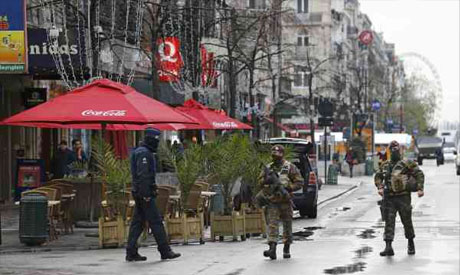
Belgian soldiers and a police officer patrol in central Brussels, November 21, 2015, after security was tightened in Belgium following the fatal attacks in Paris (Reuters)
Brussels was on terror lockdown on Saturday, with a gunman still on the run after the Paris attacks which have rattled nerves throughout Europe.
The Belgian capital closed its metro system and shuttered shopping centres as a terror alert was raised to its highest level over reports of an "imminent threat" of a gun and bomb attack similar to the horror seen in Paris last week.
Brussels-based jihadists are increasingly at the heart of the Paris investigation and police have multiplied raids in the city's poorest districts in a rush to round up suspects before they disappear or launch fresh attacks.
Investigators are working around the clock to track Salah Abdeslam, one of the gunmen who is still on the loose after a coordinated wave of attacks on Parisian nightspots that left 130 people dead on November 13.
Belgian Prime Minister Charles Michel said authorities feared a "Paris-style" attack "with explosives and weapons at several locations" despite the hundreds of soldiers patrolling Brussels that is also home to the EU and NATO.
The carnage in Paris has put all of Europe on edge as it emerged dangerous jihadists slipped between countries unnoticed, with France extending a ban on public gatherings until November 30, the start of a UN climate summit.
Turkey has detained a Belgian citizen of Moroccan origin, Ahmet Dahmani, 26, who is believed to have helped choose the sites for the Paris attacks, the Dogan news agency reported on Saturday.
The UN Security Council on Friday authorised nations to "take all necessary measures" to fight Islamic State (IS) jihadists and other extremist groups after a wave of attacks across the world left hundreds dead in a matter of weeks.
The UN resolution came after jihadist gunmen with an Al-Qaeda branch run by a notorious one-eyed militant besieged a luxury hotel in the Malian capital of Bamako, holding hostages for nine hours and killing 19 people, including two Belgians.
Mali was struck a week after Paris and Beirut -- where 44 people were killed in IS bombings -- and three weeks after IS claimed to have downed a Russian plane in Egypt's Sinai peninsula killing all 224 on board.
In grieving Paris, citizens defiantly poured into the streets and on to cafe terraces Friday night to mark one week since the carnage, with a noisy minute of non-silence as urged by several artists in the country.
Outside La Belle Equipe restaurant where 18 people were gunned down, a crowd stood under a light rain around a heap of flowers and candles singing the Marseillaise anthem before whooping and yelling at the top of their voices at 9:20 pm (2020 GMT), when the attacks started.
Benoit Seblain, drinking a beer at a cafe not far from the Bataclan where 89 people were massacred at a rock concert, admitted he was "a bit afraid".
"But we told ourselves we have to try and live like we did before," he told AFP.
The country has been shaken to its core by a dramatic week which began with the attacks and saw a violent shootout on Wednesday between police and jihadists holed up in a Paris apartment.
Suspected attack ringleader Abdelhamid Abaaoud was killed in the police assault along with his cousin Hasna Aitboulahcen and an unidentified suicide bomber.
Police on Saturday released seven people arrested during the siege, but kept hold of d Jawad Bendaoud, who has admitted lending the apartment to two people from Belgium "as a favour".
Abaaoud was a notorious Belgian jihadist thought to be fighting in Syria and his presence in Europe raised troubling questions about a breakdown in intelligence and border security.
The European Union agreed Friday to rush through reforms to the passport-free Schengen zone by the end of the year and immediately tighten border controls.
Prosecutors said Friday that two of the three men who blew themselves up near the Stade de France stadium -- the first of the wave of attacks -- may have entered Europe through Greece, posing as refugees fleeing the Syrian war.
Seven attackers were killed or blew themselves up during their assault on Paris.
Another, Salah Abdeslam, is believed to have fled to Belgium and a huge manhunt is under way to find him.
His brother Brahim blew himself up outside a Paris bar.
Both grew up in the poor Molenbeek district of Brussels, described as an extremist hotbed, before going to join the Islamic State group in Syria.
Belgium's OCAM national crisis centre raised its alert level to 4 early Saturday, "signifying a very serious threat for the Brussels region".
The centre urged citizens to avoid crowded areas such as concerts and transport hubs in Belgium's capital and recommended that authorities in the Brussels region "consider cancelling major events" in order to free up police.
Short link: